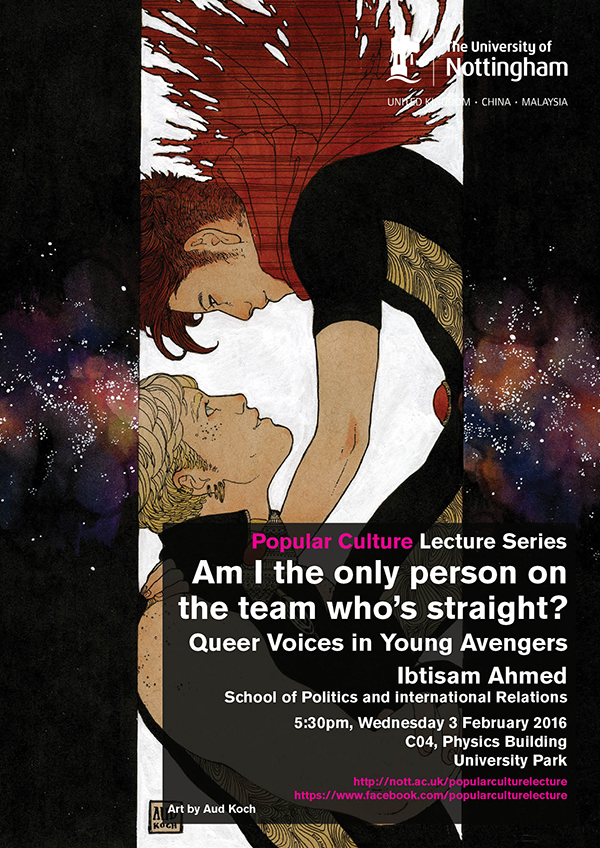
Ibtisam Ahmed, School of Politics and International Relations, will speak around the topic of ‘queer voices’ in the Young Avengers comics.
Blurb from the speaker: The politics of LGBTQ+ discourse has had a significant paradigm shift over the last few decades. With this change has come a deeper critique of queer representation and a focus towards intersectionality, with the goal of understanding notions of multiple identities and forms of oppression. Using the characters of Marvel’s Young Avengers as reference points, I propose to examine four distinct questions of intersectionality currently facing the queer community.
The first two concerns are developed or “First World” queer issues. Using the character of Wiccan as my focal point, I aim to explore the intersection between mental health and being queer. By tracing his history of being bullied in his origin issues, to tackling depression and questioning parenthood, I hope to take the debate beyond simply having a visible gay character. The second issue I propose to examine is the erasure of the B (and the unmentioned P of pansexuality) within the wider LGBTQ+ political discourse, with a focus on Hawkeye, Noh-Varr and Prodigy. All three characters have displayed fluidity in their sexualities, ranging from early explorations of bisexuality to full-fledged declarations of pansexuality. This provides an unspoken critique of how both in-universe and real-world attention of queer representation in the comics has focused on the gay male couple of Wiccan and Hulkling.
Hulkling himself provides the genesis for the first of the two developing or “Third World” queer issues I propose to examine. His alien parentage makes him a natural representation of the queer immigrant within broader American or Western culture. Delving deeper into his shape-shifting abilities, I wish to examine the image of the “ideal” in queer discourse as being a white male with blond hair. Finally, I plan on looking at how Loki’s comments regarding Asgardian notions of gender and sexuality, and Miss America’s experiences coming from a parallel universe can provide an anti-thesis to the progressive narrative of the modern neo-liberal queer saviour by standing in for early human societies that did not rigidly define or regulate romance and identity.
Admission free, all welcome. To find out more, read Ibtisam’s blog about the queer narratives and intersectional sexuality.
Part of the Popular Culture Lecture Series. For more information, visit their website. You can also follow them on Facebook and Twitter for updates.
For more information about LGBT History Month events at the University, visit our dedicated blog.